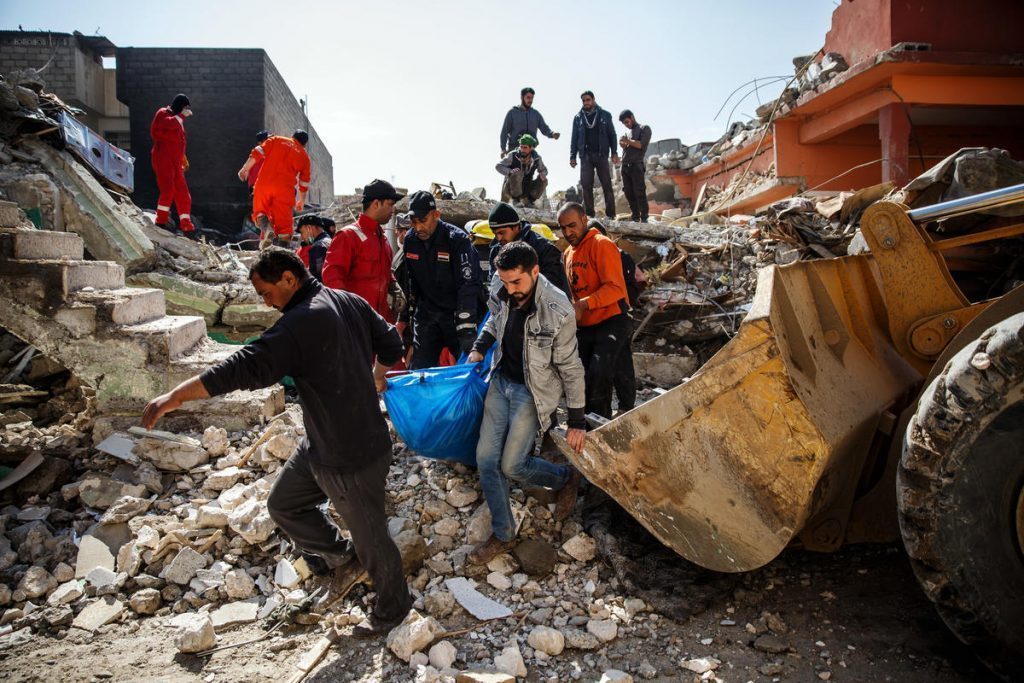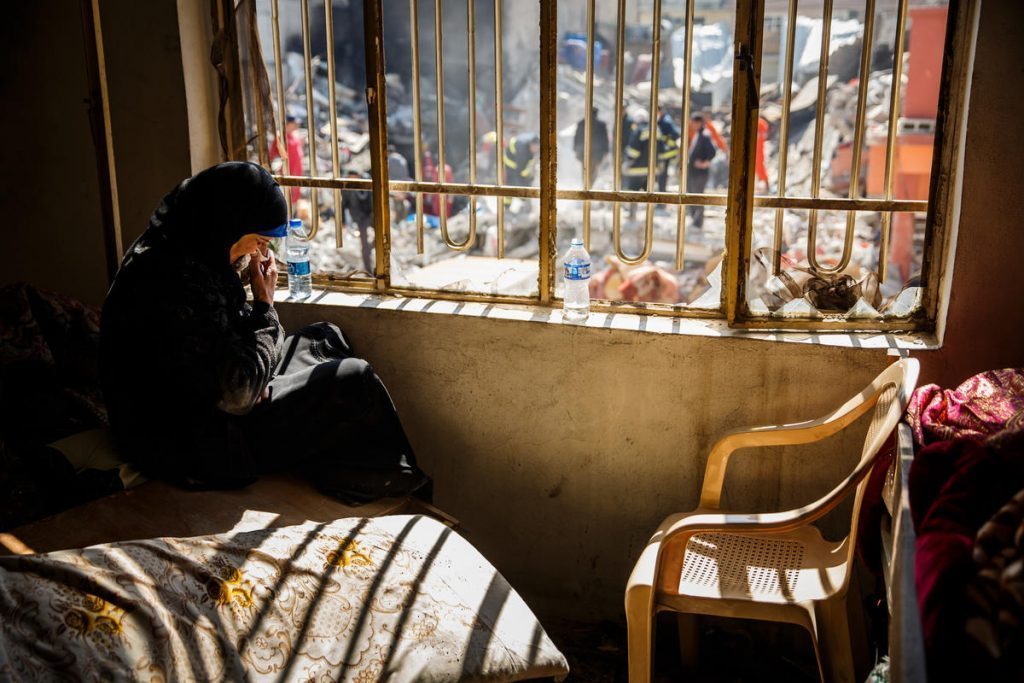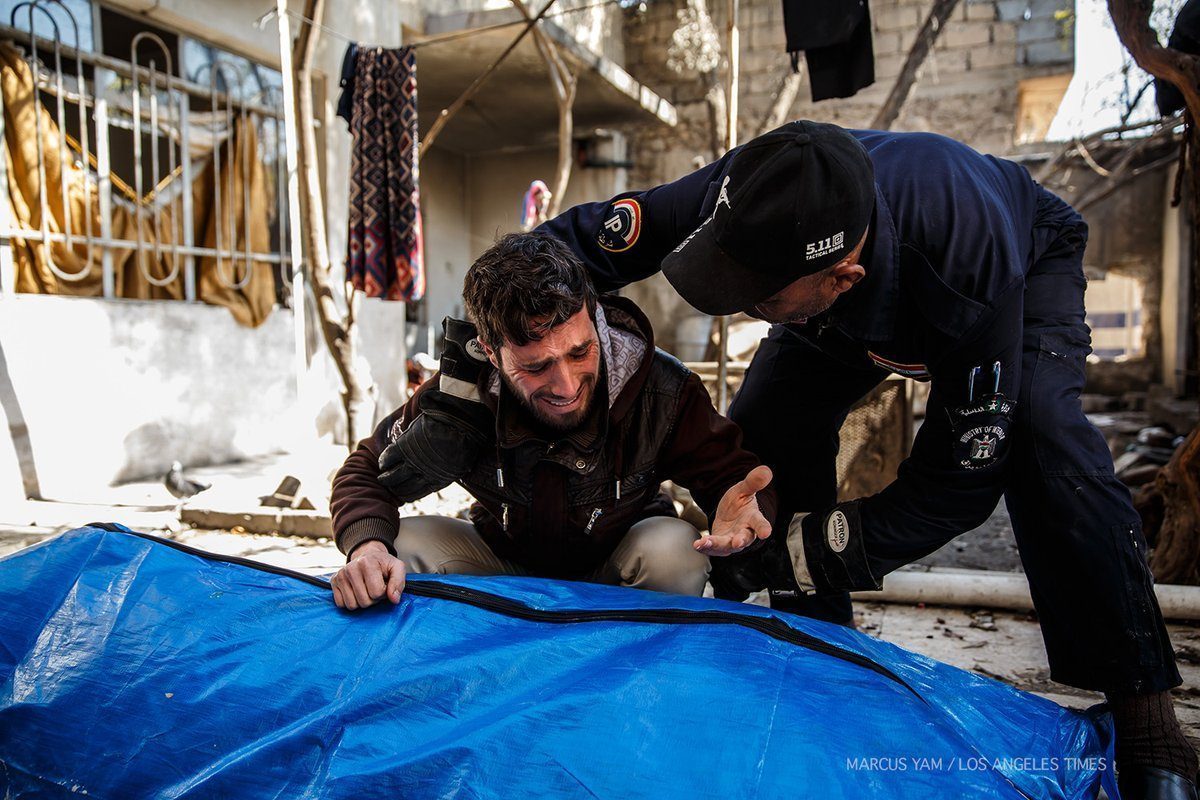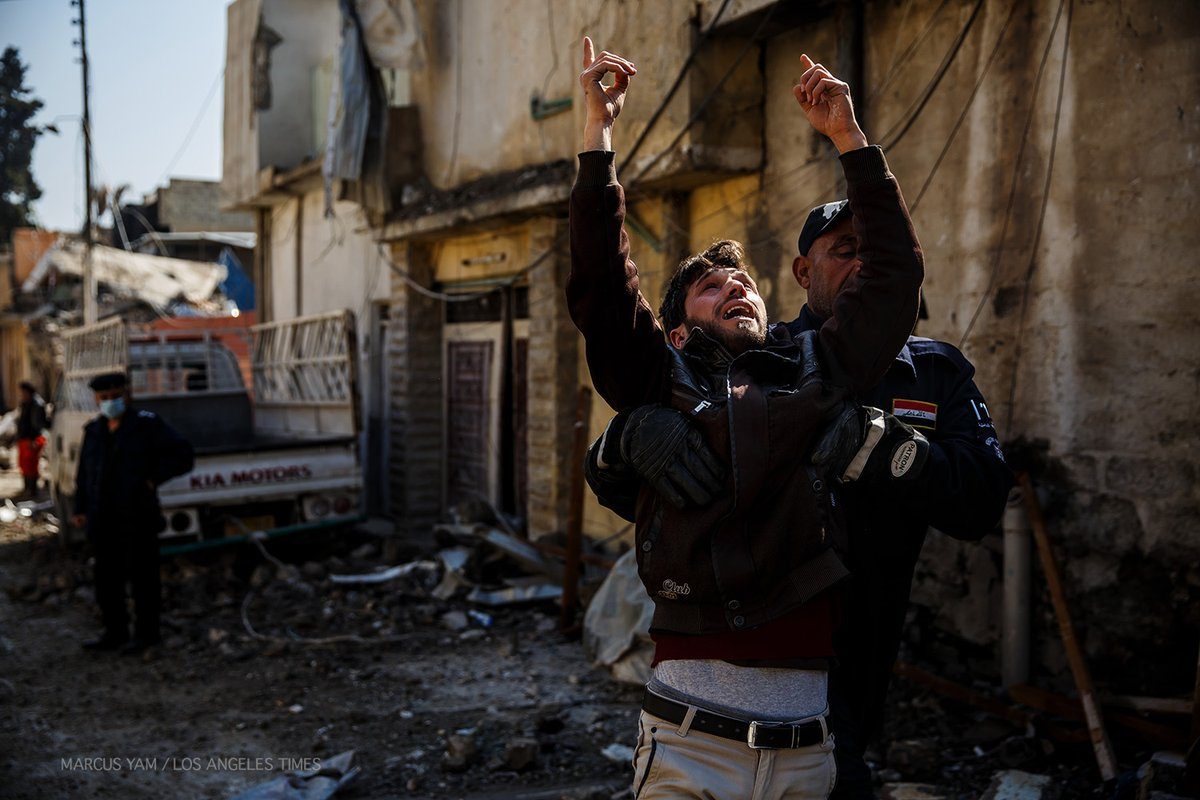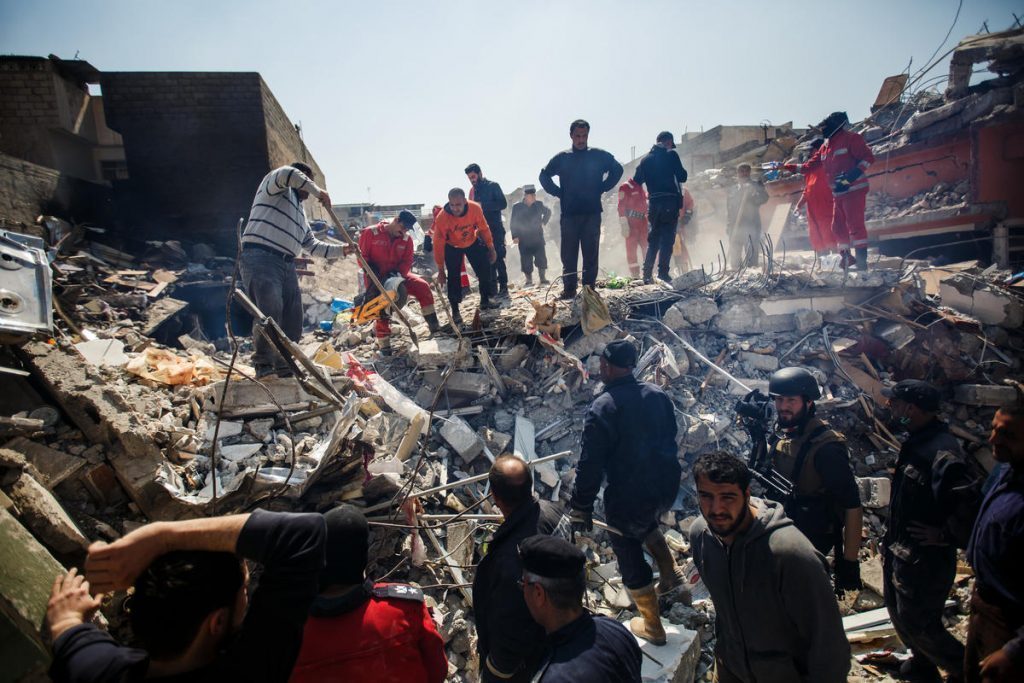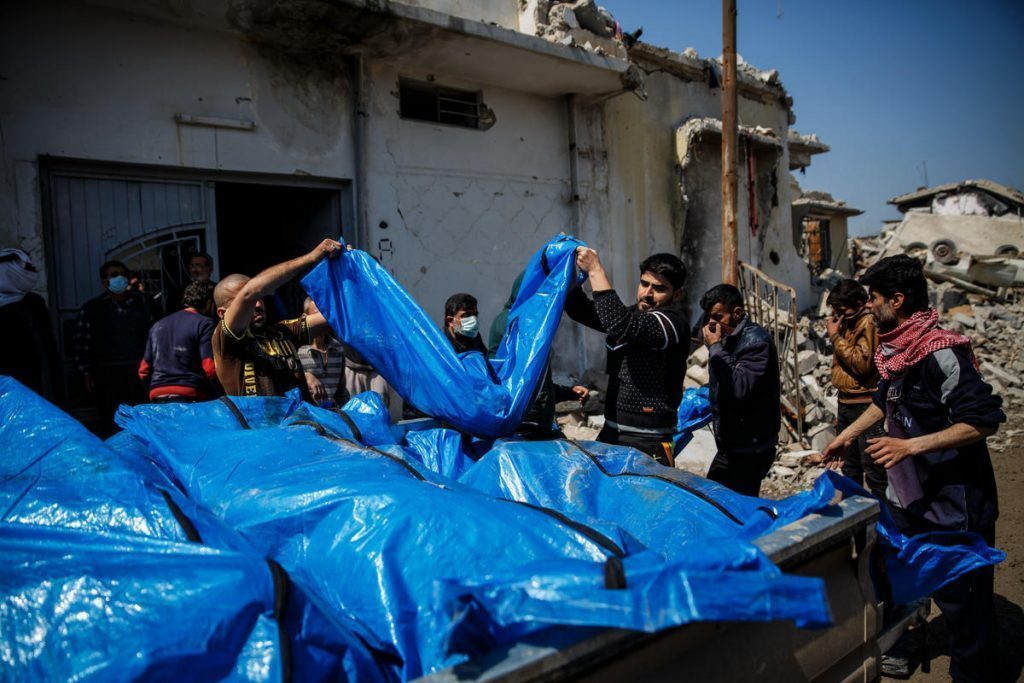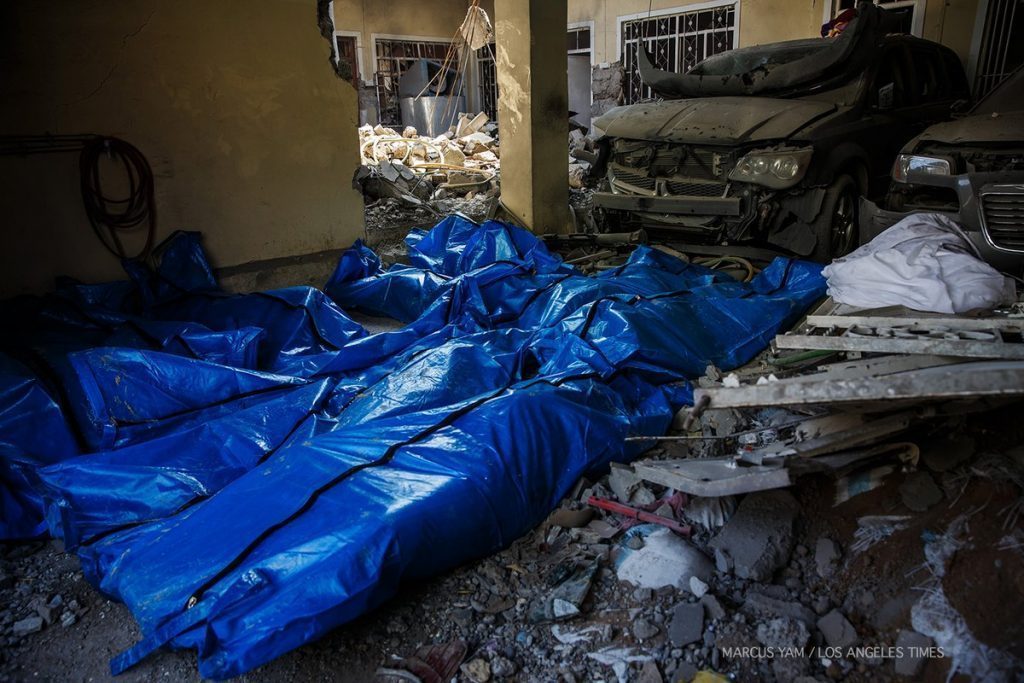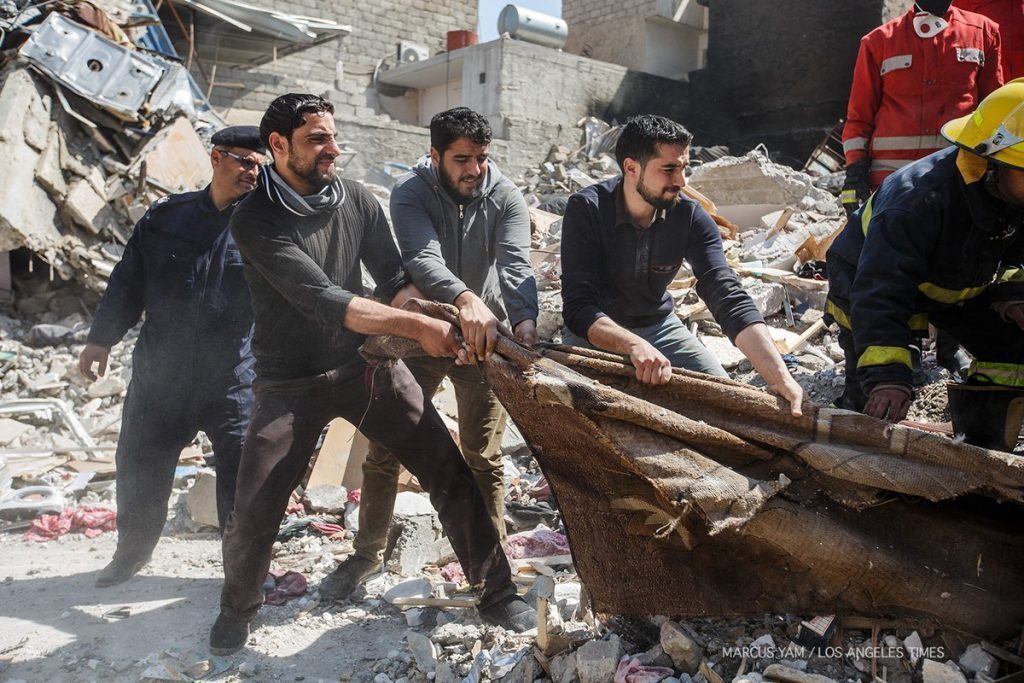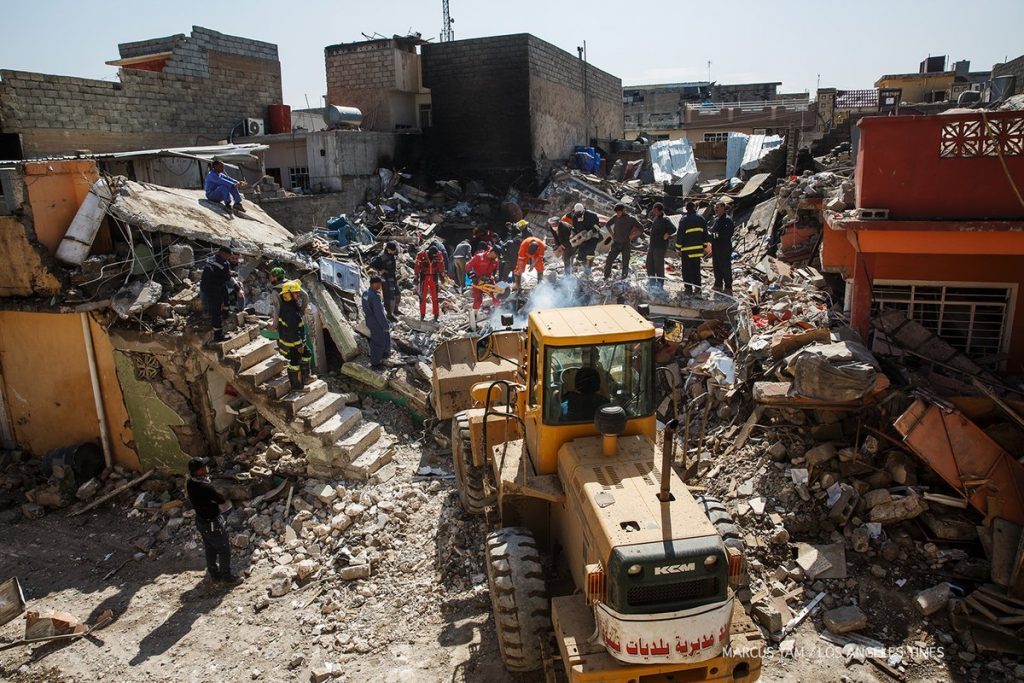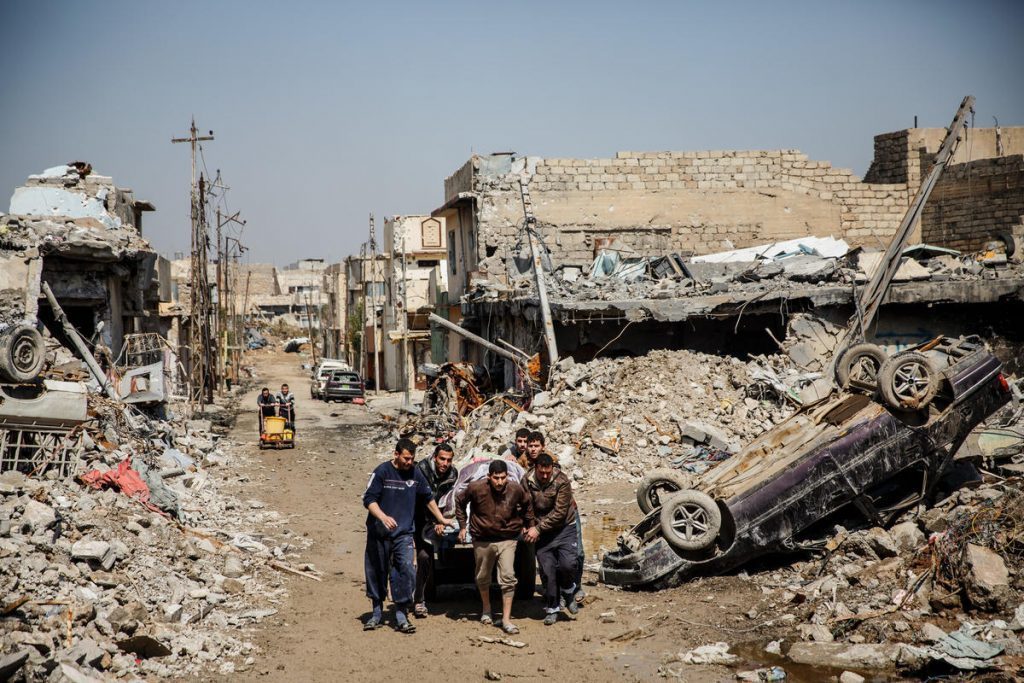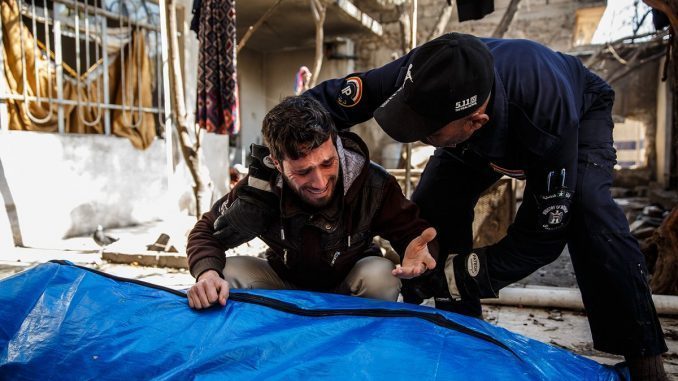
Tragic stories of loss and death were told after hundreds of civilians were killed by US-coalition airstrikes against a residential area in Iraq’s Mosul, in a new chapter of the coalition crimes against civilians, crimes that have always ready excuses and go unpunished.
Approximately 230 residents were buried in collapsed buildings in the Iraqi city of Mosul after an air strike against Islamic State triggered a massive explosion last week.
Iraqi sources said that airstrikes by the U.S.-led coalition targeting Islamic State militants may have detonated a truck filled with explosives, destroying buildings in a heavily populated area.
Local lawmaker Faris al-Sanjari told Reuters the coalition air strike had targeted a truck bomb causing a huge explosion.
“You can’t kill dozens just to destroy a booby-trapped truck parked near houses,” he said.
Civil Defence chief Brigadier Mohammed Al-Jawari told local reporters that rescue teams were retrieving bodies from under the debris in the Mosul Jadida district near Rahma hospital, the site of heavy fighting between Iraqi forces and Islamic State.
Jawari said in a statement saying teams had so far recovered 40 bodies from buildings that collapsed.
“Finding survivors is very difficult because the area is completely destroyed,” he told reporters. “It’s a very big disaster, indeed we can describe it as a disaster.”
Sources said more than 137 civilians were killed in the site of the explosion while 100 others were killed nearby as the destruction area was vey large. Bodies were believed to be still buried inside collapsed homes.
“A coalition air strike hit a residential street last Friday and destroyed at least 30 houses,” a police civil defense official said. “We halted rescue operations today for lack of heavy equipment, jack hammers, and trucks to remove debris.”
A resident said on Friday a strike hit a massive Islamic State truck bomb in a residential area, which exploded and destroyed seven homes where dozens of people were hiding.
Another resident said 25 homes were damaged. With fighting still going on, residents have been unable to recover bodies since the strike, the resident said.
Earlier on Saturday, the UN expressed profound concern over the escalating civilian death toll in the battle to retake Mosul.
“We are stunned by this terrible loss of life,” Lise Grande, the humanitarian coordinator for Iraq, said in a statement.
Incredibly painful to watch people pull out their loved ones, clutch them, put them in body bags & live to bury them https://t.co/O2G7hahY47 pic.twitter.com/XQIM8jBJtE
— Marcus Yam (@yamphoto) March 25, 2017
Tragic stories of loss and death
Tragic photos were taken from the scenes of the deadly airstrikes’ aftermath.
Nearly 50 bodies could be seen Friday in the area of the alleged airstrike, where relatives helped recover remains.
One man approached a bag that contained the body of a pregnant woman, touched it, talked to it, then began to cry and wail. Civil defense workers had to lead him away.
In a nearby garage where bodies were being stored, another man who lost 32 relatives tried to identify them based on what had been recovered: some government identification cards, a brown wallet and a black purse. But he started to sob, and had to step outside, sit on the curb and hang his head.
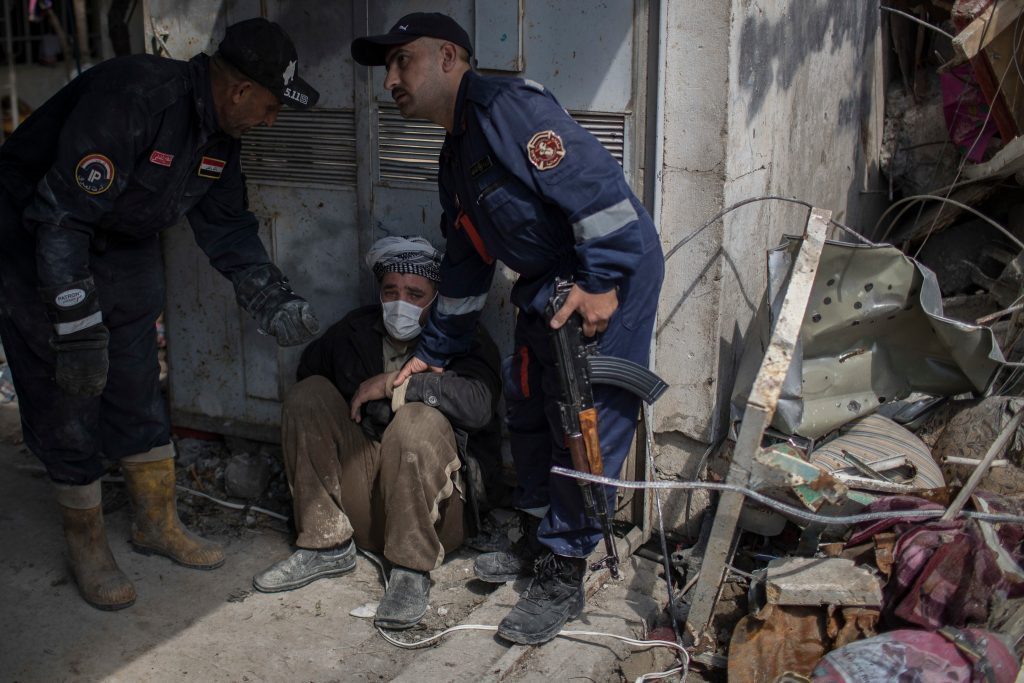
Munatha Jasim watched Iraqi civil defense workers in red suits scurry among the ruins of her neighbors’ homes Friday, extracting the dead and zipping them into blue body bags.
The massive explosion that tore through Baghdad Street last week killed nine of Jasim’s relatives, including son Firas, 7, and daughter Taiba, 4. “We recovered half his body,” she said of the 7-year-old. “The rest is still there.”
Jasim walked down a dirt street that reeked of death. Bodies were still pinned under houses; blackened hands and a pair of feet in yellow high-top sneakers protruded from one place in the rubble. Finally, she stopped and pointed to the ruins of her home. She said a militant sniper had set up across the street from her house before the attack.
“Just because one Islamic State [fighter] was on our house, the aircraft bombed us,” she said tearfully.
Residents who witnessed the explosion said it came after militants forced them into their homes.
“Daesh was not letting us go out,” said Ihab Adnan, 35, a laborer, using a common term for Islamic State as he picked his way through the remains of his uncle’s house next door.
Adnan pointed to a photo in the ruins of his 13-year-old cousin, Ali Ramadan, whose body was now zipped in a body bag.
He said a series of airstrikes began at just after 5 p.m., and “everything was exploding.”
He could hear his relatives screaming next door. Adnan was screaming, too. He emerged to discover several families had been buried in their collapsed houses: 18 in his uncle’s house, 72 in a nearby home, 130 in another. He could hear some of the injured crying.
“We were running and taking people out” of the ruins, Adnan said.
They’re still in there, under the rubble
Truck driver Rayid Najim Abdullah said he felt an airstrike hit his home and then ignite a truck packed with explosives parked nearby.
“The house just fell on us,” said Abdullah, 48.
His wife and three children, ages 12, 10 and 5, were all hospitalized Friday. Abdullah also had a cut on his nose, and looked bereft.
“I lost my car and everything,” he said, gesturing at the remains of his street.
Majid Taib Najim, 47, was sheltering inside his house with 40 relatives when he saw aircraft bomb the area, striking his house and the truck. He said they were lucky to escape unharmed.
“All the people that died here is because of a mistake by the aircraft,” Najim said.
Suha Khalid Gharab, 60, lost 20 relatives in the explosion, including a 1-year-old.
“It’s a crime, killing civilian people,” she said as she sat inside her damaged house Friday, surrounded by neighbors.
Saleh Jamal, a longtime civil defense worker, surveyed the scene from a garage full of body bags nearby and said it was the worst he has seen in 30 years outside of Baghdad, comparing it to the deadly bombing of the capital’s Karada district last year that killed about 300 people.
“Yesterday we brought up 10 small children,” he said, shaking his head.
Turkya Azudin sat in an empty room above the garage, watching the teams at work below and counting relatives she had lost: 18.
Neighbor Marwan Saleh, 50, sat next to her, awaiting word on the bodies of his daughter, son-in-law and 2-month-old grandson.
“They’re still in there,” he said, gesturing to the collapsed house and vowing to keep vigil “until I recognize them.”
Saleh said he hopes Iraqi forces learn from the deaths on Baghdad Street.
“It’s too much, all these airstrikes on this one area. Why?” he said. “Liberate another way, not this way.”
Excuses are always ready
If confirmed, the series of airstrikes would rank among the highest civilian death tolls in an American air mission since the United States went to war in Iraq in 2003. And the reports of civilian deaths in Mosul came immediately after two recent incidents in Syria, where the coalition is also battling the Islamic State from the air, in which activists and local residents said dozens of civilians had been killed.
Taken together, the surge of reported civilian deaths raised questions about whether once-strict rules of engagement meant to minimize civilian casualties were being relaxed under the Trump administration, which has vowed to fight the Islamic State more aggressively.
The coalition did not give details on any specific air strike or comment on a Mosul Jadida district operation, and the excuses were always ready as they said investigation are bein conducted.
“We are aware of reports on airstrikes in Mosul resulting in civilian casualties. The Coalition conducted several strikes near Mosul and we will provide this information to our civilian casualty team for further investigation,” the coalition said in a statement.
Mark Kimmitt, a former US assistant secretary for political and military affairs, told Al Jazeera that while the deaths of civilians were unfortunate, such “incidents happen in combat”.
“Coalition forces are doing everything they can, along with Iraqi security forces, to minimize civilian casualties.
A spokesman for the United States Central Command said that the military was seeking to determine whether the explosion in Mosul might have been prompted by an American or coalition airstrike, or was a bomb or booby trap placed by the Islamic State.
“It’s a complicated question, and we’ve literally had people working nonstop throughout the night to understand it,” Colonel Thomas said in an interview. He said the explosion and the reasons behind it had “gotten attention at the highest level.”
As to who was responsible, he said, “at the moment, the answer is: We don’t know.”
Airstrikes are called more randomly under Trump’s lead
Before, Iraqi officers were highly critical of the Obama administration’s rules, saying that many requests for airstrikes were denied because of the risk that civilians would be hurt. Now, the officer said, it has become much easier to call in airstrikes.
This is the second time this week that the military has opened an investigation into civilian deaths reported to have been caused by American airstrikes.
On Tuesday, Central Command said it was investigating an American airstrike in Syria on March 16 that officials said killed dozens of “al-Qaeda operatives” at a meeting place that activists and local residents maintain was part of a religious complex.
But the Syrian Observatory for Human Rights said that 49 people had been killed in what the group described as a massacre of civilians
Some American military officials had also chafed at what they viewed as long and onerous White House procedures for approving strikes under the Obama administration. However, Trump has indicated that he is more inclined to delegate authority for launching strikes to the Pentagon and commanders in the field.
Since the first days of his elections campaign, President Trump has said that his top priority is fighting ISIS and ending its presence in the region at all costs, apparently even at the cost of hundreds of innocent civilians lives.
“We cannot let this evil continue. Nor can we let the hateful ideology of radical Islam — its oppression of women, gays, children and non-believers — be allowed to reside or spread within our own countries,” Trump said in an August speech. “We will defeat radical Islamic terrorism, just as we have defeated every threat we have faced in every age before.”

